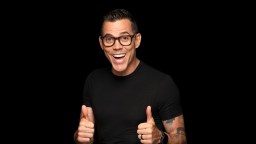If you were alive in the ‘90s and had access to Nickelodeon, chances are you found Kel Mitchell on your screen. He was everywhere: All That, Cousin Skeeter and his own co-titular show with SNL legend Kenan Thompson. And let’s not forget one of the most iconic movies about burgers in film history. (If you don’t know what we’re talking about, please watch Good Burger immediately.)
Despite this impressive résumé, the 48-year-old’s life as a world-famous performer has been far from smooth, as career troubles and a family split once left him on the brink of suicide. Today, though, he is a man learning to love and better himself (and others), spreading a message of perseverance, positivity and self-acceptance.
Staring into the abyss
In 2005, Chicago-born Mitchell was at the height of his success. He was an established star and his comedic prowess was expanding into movies and big-time cameos. But while Mitchell’s career blossomed, his personal life wilted.
“I was alienated from my children at one point because of a divorce,” Mitchell says. “My ex’s emotions were all over the place; it was a toxic relationship. I was fighting in court to see my kids.”
Mitchell isolated himself as he struggled to find light at the end of the tunnel. The family he had tried to build in the image of his parents’ blissful marriage was crumbling, and inside, so was he. Alone in a hotel one night, he was about to end it all.
“I didn’t want to live here on Earth,” he remembers. “I was very suicidal at that moment and was on the other side of a balcony. To think ‘I want to hit an off button,’ that’s a scary place to be.”
But before Mitchell could go through with it, he heard a voice that told him to step back.
Finding faith
“When I tell this story, I tell people I heard a voice that said, ‘Get off the balcony and lock yourself in the bathroom.’ I know it was the voice of God,” he recalls.
Mitchell believes that a higher power spoke to him that night, instructing him to reconnect with the people he loved and to share the story that was causing him so much pain.
“I decided to turn on the camera and put it up on YouTube. What was beautiful was the amount of men and women in the comments tearing up, asking for advice and telling their stories,” he says. “It turned into a blessing.”
Everything changed when Mitchell decided to open up. When he realized that he wasn’t alone, and never was, he was able to find a new purpose in spreading joy. In 2019 he took this mission up a notch by becoming a licensed pastor, helping others to heal in their own time through faith.
Uncomfortable healing
After learning more about himself, Mitchell realized that to truly heal he needed to let go of the anger and suffering that led him to the edge of that balcony. To do this, he needed to forgive. But forgiveness isn’t always easy.
“I want to see things through God’s eyes and not mine,” Mitchell explains. “That might mean forgiving someone when I don’t want to forgive them. It might be a path that I don’t want to take, but I go ahead and take it because it’s a positive thing that God is telling me to do.”
He remembers when a TV executive who had made his life hell was set to receive a lifetime achievement award, and Mitchell was tasked to present it to him. His initial response was, understandably, “No.” But when he thought about what happened between them, he chose to forgive, present the award, and even work with him again. He now understands that this man’s aggression came from his own personal pain, something Mitchell never would’ve found out if he didn’t forgive and reconnect.
“He never apologized,” he reveals. “But he came to my dressing room and said, ‘I love the man that you have become.’”
We interviewed Kel Mitchell for Question Your Perception Box, a Big Think interview series created in partnership with Unlikely Collaborators. As a creative non-profit organization, they’re on a mission to help people challenge their perceptions and expand their thinking. Often that growth can start with just a single unlikely question that makes you rethink your convictions and adjust your vantage point. Watch Mitchell’s full interview above, and visit Perception Box to see more in this series.
KEL MITCHELL: Hey. Oh! All right, let's do this. Ow! Whoo! Okay- all right, let's get deep. I'm Kel Mitchell, and I'm an author, pastor, husband, writer, actor, comedian- all the above.
They're different colors, that's cool- thought they'd be the same color, oh, okay. Ooh! Okay. I was a theater kid, and I remember I was being creative and doing some choreography, and this one kid just had this anger for me that I didn't know about, and he just bust out and yelled, "Kel, I hate you! I just hate you, and how you do what you do!"
But it's real interesting how those things, if you don't deal with it, show up as an adult. I think we do that a lot of times, where we might feel like we're not enough based on memories where we felt like that. This mind of ours is a computer that holds memories, so when your body feels something that happened to you within the past, all those things come up.
And what happens is that we usually project that on the person that's in front of us and think that, "Oh, you're- you're just like that," and that person that's in front of you- nothing like that- but they did something, you know, that might've triggered something in your mind to make you think that they're the negative thing that you're holding onto.
Wow, where'd that come from? Green, let's get it, all right, let's see. I love that, that's a loaded question and here's the answer: It was more of me feeling disconnected from others, and this has been something that, now I feel, I won't say perfected, but I'm a lot better at it now.
Before, I've always felt that I was the only one going through what I was going through. I wasn't expressing my pain or expressing how I really felt to others, because I kept it in. Throughout my career and throughout my process, if I was done wrong, I wouldn't express myself all the way, how I really felt; it would be more of, "Oh, okay, cool, Imma do my thing."
When I decided to go, "No, no, no, I'm not gonna do that," I'm just gonna sit down with them and see how they really are. And having a real conversation and being real- what I started to discover was that relationship is very important, meaning that there's always room to understand deeply, understand others deeply.
Okay, orange, all right. For me, if I could think of one, would definitely be being in court, and I was alienated from seeing my children at one point because it was just a divorce, you know, happened and of course, through a process like that, you would be very hurt, you know what I mean?
Throughout that process, and angry, and all those different things. But then on the other side of that, when I started to see other men that were going through this as well, I started to tell my story. I decided to turn on the camera, and I put it up on YouTube. I'm currently going to court fighting to see my children, and it's been very hard.
And what was beautiful was the amount of men and women that went through this in the comments, tearing up, you know, saying what they went through. It was a beautiful moment, and within that I saw that it turned into a blessing.
Hey, yellow. I'll take it back to when I didn't wanna live here on Earth, and I was very suicidal at that moment, and actually was on the other side of a balcony. And to have the thought process of, "I wanna hit an off button," that's a scary place to be because for me, that was my answer.
I always did it like, "I gotta be perfect," my relationship needs to be like my parents' relationship that I viewed, but then I go through this horrible divorce and then it's this embarrassment. And I remember, 'cause when I tell this story, I tell people I heard a voice that said, "Lock yourself in the bathroom, get off this balcony, and lock yourself in the bathroom," but I know it was the voice of God.
I went through my journey after that, getting back to a relationship with him, and that took time- and then finding myself, and saying, "Kel, you need to just find your love within you," and then doing that, then my beautiful wife comes to me, and my two oldest children and my two youngest children, loving them all the same, within that, and understanding that my journey is a- a learning process in that mistakes make you who you are, right?
I like video games- old school ones- and so in Nintendo, they had a code that you learned so you can jump levels; the designers made this code so that way they can fix bugs within the game. What I started to understand was, as I got closer to God and I start to get closer with mistakes or understanding who I was, now I know what the designer knows, the designer of me.
So now I can jump levels, and I can get through things a little quicker than some might do because they are holding on to mistakes. I think that's beautiful, when you go, "There's no mistakes, there's just lessons."
And so it's not going back and fixing anything 'cause we can't go back. One of my favorite movies is "Back to the Future," but you can't go back and fix it, man. You are who you are, so just learn from it and keep it pushing.
Y'all said let's get deep, right?






